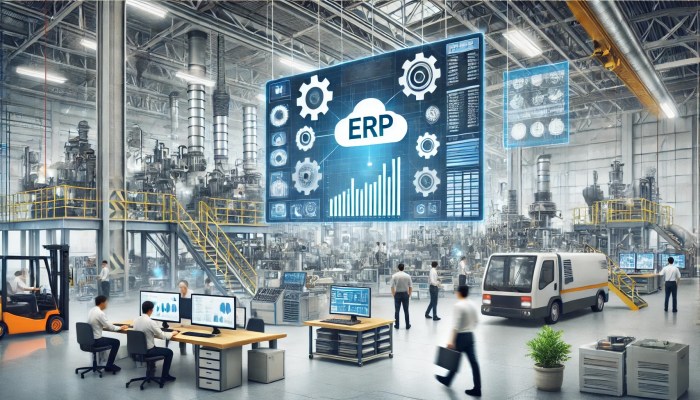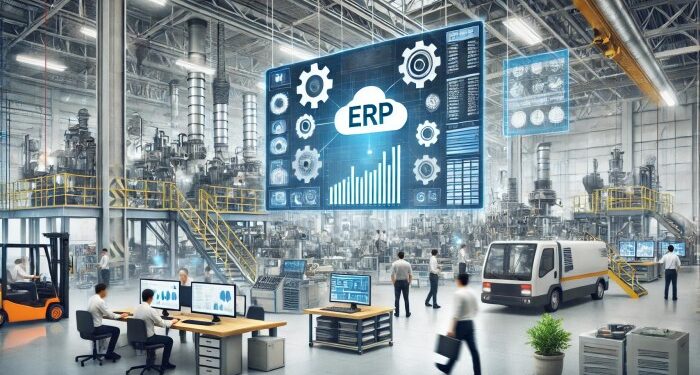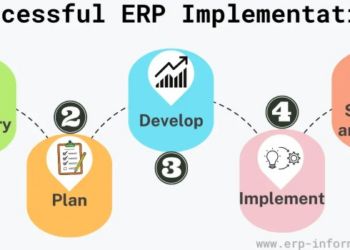Embark on a journey through the realm of ERP solutions tailored for the manufacturing sector. Dive into a landscape where technology meets industry, revolutionizing processes and enhancing productivity.
Learn about the pivotal role ERP systems play in streamlining manufacturing operations and discover how real-time data access is transforming decision-making in this dynamic field.
Overview of ERP Solutions for Manufacturing
ERP solutions play a crucial role in the manufacturing industry by integrating various business processes and functions into a centralized system. These systems help streamline operations, improve efficiency, and provide real-time data for better decision-making.
Role of ERP Solutions in Manufacturing
ERP systems in manufacturing help in managing inventory, production planning, scheduling, quality control, and supply chain management. By automating repetitive tasks and providing accurate data, ERP solutions enable manufacturers to optimize their processes and reduce costs.
- Improved Inventory Management: ERP systems allow manufacturers to track inventory levels accurately, minimize stockouts, and avoid overstock situations.
- Enhanced Production Planning: ERP solutions help in creating realistic production schedules based on demand forecasts, resource availability, and lead times.
- Effective Quality Control: ERP systems enable manufacturers to monitor quality control processes at every stage of production, ensuring compliance with industry standards.
- Optimized Supply Chain Management: ERP solutions provide visibility into the entire supply chain, from raw material procurement to product delivery, leading to better coordination and efficiency.
Popular ERP Solutions in Manufacturing
Some of the popular ERP solutions used in the manufacturing industry include:
- SAP ERP: SAP offers a comprehensive suite of ERP applications tailored for manufacturing companies, covering areas such as finance, procurement, production, and sales.
- Oracle ERP Cloud: Oracle provides a cloud-based ERP solution that integrates various business functions, offering scalability and flexibility for manufacturing organizations.
- Microsoft Dynamics 365: Microsoft's ERP solution includes modules for supply chain management, production planning, quality control, and CRM, catering to the unique needs of manufacturing businesses.
- Infor CloudSuite Industrial: This ERP solution is designed specifically for discrete and process manufacturers, offering features for inventory management, shop floor control, and order processing.
Key Features of ERP Solutions for Manufacturing
ERP solutions for manufacturing businesses offer a range of key features that are essential for optimizing production processes and improving overall efficiency. These features help in streamlining operations, enhancing decision-making, and ensuring better resource allocation. One of the most important aspects of ERP systems for manufacturing is the real-time data access they provide, allowing companies to make informed decisions based on up-to-date information.
Inventory Management
Effective inventory management is crucial for manufacturing businesses to ensure optimal production levels and minimize waste. ERP solutions offer features such as real-time tracking of inventory levels, automated replenishment processes, and demand forecasting to help businesses maintain the right balance of stock.
Production Planning and Scheduling
ERP systems enable manufacturing companies to create detailed production plans, schedule tasks efficiently, and allocate resources effectively. By optimizing production schedules and workflows, businesses can reduce lead times, improve on-time delivery, and enhance overall productivity.
Quality Control
Quality control is a critical aspect of manufacturing, and ERP solutions help businesses implement robust quality management processes. Features such as real-time monitoring of production processes, automated quality checks, and integration with quality assurance systems enable companies to maintain high product standards and comply with industry regulations.
Supply Chain Management
ERP systems streamline supply chain processes by providing visibility into the entire supply chain, from raw material sourcing to distribution. Manufacturing businesses can optimize supplier relationships, track shipments, and manage inventory levels effectively, ensuring smooth operations and reducing costs.
Analytics and Reporting
ERP solutions offer advanced analytics and reporting capabilities that allow manufacturing companies to gain valuable insights into their operations. By analyzing key performance indicators, identifying trends, and generating custom reports, businesses can make data-driven decisions to improve efficiency, reduce costs, and drive growth.
Implementation of ERP Solutions in Manufacturing
Implementing an ERP solution in a manufacturing setting requires careful planning and execution to ensure a smooth transition and maximum benefits for the organization. Let's explore the steps involved, common challenges faced, and tips for successful implementation.
Steps Involved in Implementing an ERP Solution
- Assessment and Planning: Evaluate current processes, identify key requirements, and set clear goals for the ERP implementation.
- Selection of ERP System: Choose a solution that aligns with the specific needs of the manufacturing industry and can support future growth.
- Data Migration: Transfer existing data to the new ERP system while ensuring accuracy and integrity.
- Training and Testing: Provide comprehensive training to employees on using the ERP system and conduct thorough testing to identify any issues.
- Go-Live and Support: Implement the ERP system across the organization, provide ongoing support, and monitor performance for optimization.
Common Challenges Faced During ERP Implementation in Manufacturing
- Resistance to Change: Employees may be reluctant to adopt new processes and technologies, leading to delays in implementation.
- Data Integration Issues: Ensuring seamless integration of data from various sources can be complex and time-consuming.
- Customization Challenges: Customizing the ERP system to meet specific manufacturing requirements without compromising its core functionality can be challenging.
- Budget Overruns: Unexpected costs during implementation can strain the organization's financial resources.
Tips for a Successful ERP Implementation for Manufacturing Companies
- Engage Stakeholders: Involve key stakeholders from different departments in the implementation process to gain their support and insights.
- Set Realistic Expectations: Establish clear goals and timelines for the ERP implementation, keeping in mind the complexities of the manufacturing industry.
- Provide Training and Support: Invest in comprehensive training programs and ongoing support to help employees transition smoothly to the new ERP system.
- Regular Evaluation and Optimization: Continuously monitor the performance of the ERP system, gather feedback, and make necessary adjustments for improved efficiency.
Benefits of Using ERP Solutions in Manufacturing

ERP solutions offer a wide range of benefits for manufacturing companies, helping them streamline operations, improve efficiency, and make better decisions based on real-time data.
Improved Efficiency
ERP systems centralize data and processes, eliminating the need for manual data entry and reducing errors. This automation speeds up processes, reduces lead times, and ensures that production runs smoothly. For example, a manufacturing company implementing an ERP system saw a 20% increase in production efficiency within the first year.
Cost Reduction
By optimizing inventory management, scheduling, and resource allocation, ERP solutions help reduce costs associated with excess inventory, production delays, and inefficient use of resources. This can lead to significant cost savings for manufacturing companies. A case study of a large automotive manufacturer showed a 15% reduction in production costs after implementing an ERP system.
Enhanced Decision-Making
ERP systems provide real-time data and insights into all aspects of the manufacturing process, allowing decision-makers to make informed decisions quickly. With access to accurate and up-to-date information, managers can identify trends, pinpoint areas for improvement, and make strategic decisions to drive the business forward.
For instance, a textile manufacturer used ERP data analytics to identify bottlenecks in the production process and make adjustments that increased overall output by 25%.
End of Discussion
In conclusion, ERP solutions for manufacturing stand as the cornerstone for operational excellence in today's industrial landscape. With benefits ranging from enhanced efficiency to informed decision-making, embracing ERP systems is key to unlocking success in the manufacturing realm.
FAQ Compilation
How do ERP solutions benefit manufacturing businesses?
ERP solutions enhance efficiency, reduce costs, and improve decision-making processes by streamlining operations and providing real-time data access.
What are some popular ERP solutions used in manufacturing?
Popular ERP solutions in manufacturing include SAP, Oracle, Microsoft Dynamics, and Syspro.
What are common challenges faced during ERP implementation in the manufacturing industry?
Common challenges include resistance to change from employees, data migration issues, and ensuring system compatibility with existing processes.











